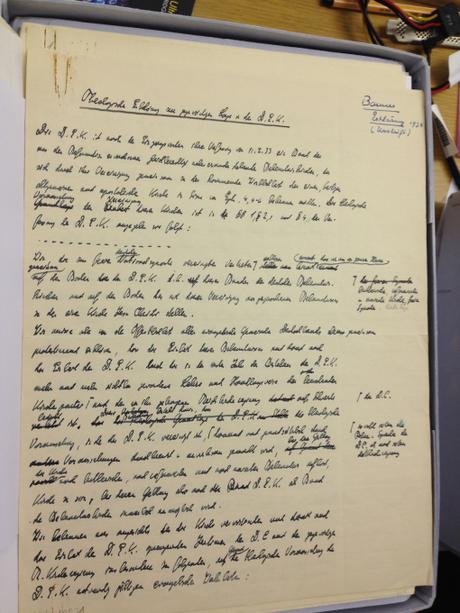SolidarityWhile staying with a friend in Basel once I visited the home of the late Protestant theologian Karl Barth. In the basement, where his personal library is kept, I looked through his marked-up copy of Mein Kampf and other significant books – Barth had been deprived of his university chair by Hitler and had then left Germany. The warden then handed me a box in which I found the original draft manuscript of what is considered to be one of the twentieth century’s most important political documents: the Barmen Declaration. It led to Christian opposition to the Nazis by asserting theological principles.
Together, a number of theologians found the courage to challenge dominant assumptions about power, human value and the meaning of it all. Many of them suffered from the consequences of their decision that order needs to be brought out of chaos and that this can only come at personal cost.
In a different context, the Czech philosopher Jan Patočka speaks of “the solidarity of the shaken”. In other words, the experience of a common challenge brings with it the courage to stand up and stand out. The “solidarity of the shaken” is, I think, a phrase pertinent to today’s world.
What both Barmen and Patočka hold to is the conviction that faith is not a spiritualised escape from the demands of a challenging material world. Those who complain when religious leaders get involved in politics often assume that faith takes us out, rather than commits us to, the real world. But, it is impossible to see Christianity, for example, as a merely spiritual creed when at the heart of every Christian narrative is incarnation – God committing himself to the world in all its chances and contingencies and not opting out of the inconvenient consequences of materiality. The word Jesus says it all.
The current uncertainties of the world have blown a hole in western assumptions about control – of life, the environment and progress – and have shaken individuals and entire societies to their roots. The big themes, so easily hidden while we (in Neil Postman’s words) amuse ourselves to death, are now resurgent: mortality, fear, love, hope, faith, and so on. And through it all there is the possibility of a solidarity of the shaken – as we recognize the fragility of life and the common need for human interdependence.
It has been said that a crisis does not create character; it reveals it. Actually, both are true. But, as we navigate uncharted waters in the months ahead, it is the solidarity of humility that must trump the sham of hubris.

